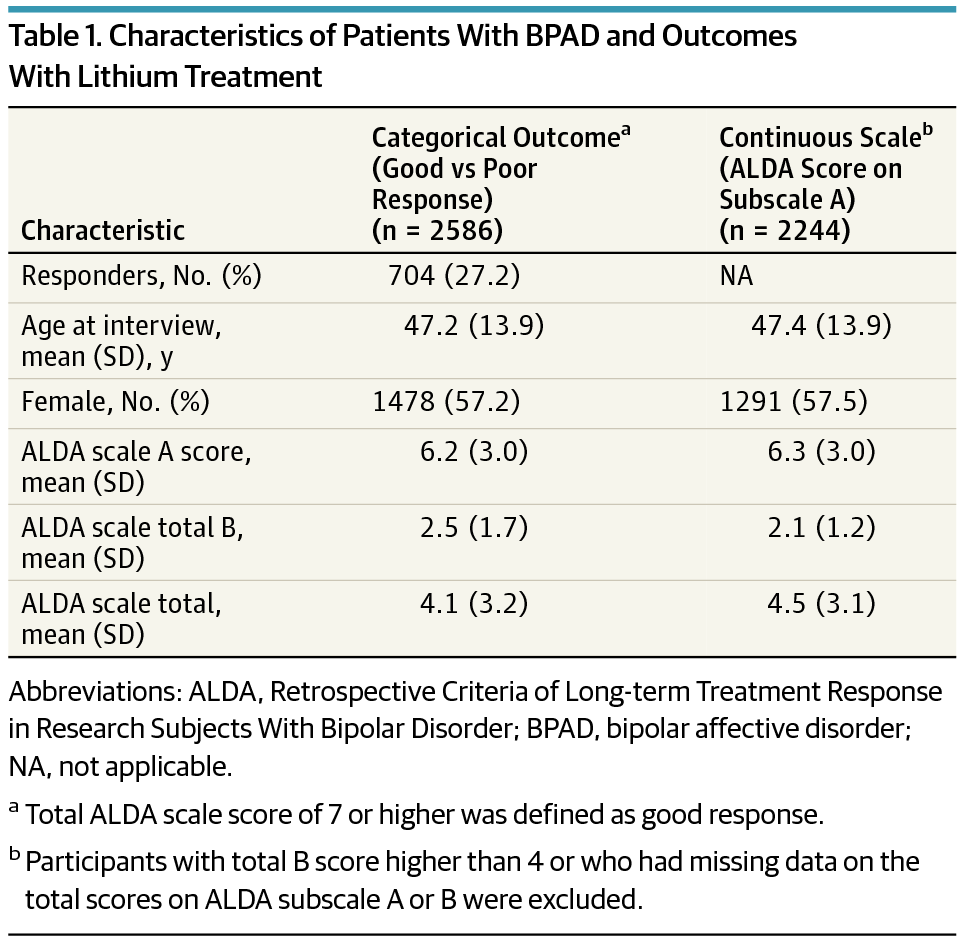JAMA Psychiatry ( IF 22.5 ) Pub Date : 2018-01-01 , DOI: 10.1001/jamapsychiatry.2017.3433 null null,Azmeraw T. Amare,Klaus Oliver Schubert,Liping Hou,Scott R. Clark,Sergi Papiol,Urs Heilbronner,Franziska Degenhardt,Fasil Tekola-Ayele,Yi-Hsiang Hsu,Tatyana Shekhtman,Mazda Adli,Nirmala Akula,Kazufumi Akiyama,Raffaella Ardau,Bárbara Arias,Jean-Michel Aubry,Lena Backlund,Abesh Kumar Bhattacharjee,Frank Bellivier,Antonio Benabarre,Susanne Bengesser,Joanna M. Biernacka,Armin Birner,Clara Brichant-Petitjean,Pablo Cervantes,Hsi-Chung Chen,Caterina Chillotti,Sven Cichon,Cristiana Cruceanu,Piotr M. Czerski,Nina Dalkner,Alexandre Dayer,Maria Del Zompo,J. Raymond DePaulo,Bruno Étain,Peter Falkai,Andreas J. Forstner,Louise Frisen,Mark A. Frye,Janice M. Fullerton,Sébastien Gard,Julie S. Garnham,Fernando S. Goes,Maria Grigoroiu-Serbanescu,Paul Grof,Ryota Hashimoto,Joanna Hauser,Stefan Herms,Per Hoffmann,Andrea Hofmann,Stephane Jamain,Esther Jiménez,Jean-Pierre Kahn,Layla Kassem,Po-Hsiu Kuo,Tadafumi Kato,John Kelsoe,Sarah Kittel-Schneider,Sebastian Kliwicki,Barbara König,Ichiro Kusumi,Gonzalo Laje,Mikael Landén,Catharina Lavebratt,Marion Leboyer,Susan G. Leckband,Alfonso Tortorella,Mirko Manchia,Lina Martinsson,Michael J. McCarthy,Susan McElroy,Francesc Colom,Marina Mitjans,Francis M. Mondimore,Palmiero Monteleone,Caroline M. Nievergelt,Markus M. Nöthen,Tomas Novák,Claire O’Donovan,Norio Ozaki,Urban Ösby,Andrea Pfennig,James B. Potash,Andreas Reif,Eva Reininghaus,Guy A. Rouleau,Janusz K. Rybakowski,Martin Schalling,Peter R. Schofield,Barbara W. Schweizer,Giovanni Severino,Paul D. Shilling,Katzutaka Shimoda,Christian Simhandl,Claire M. Slaney,Alessio Squassina,Thomas Stamm,Pavla Stopkova,Mario Maj,Gustavo Turecki,Eduard Vieta,Julia Volkert,Stephanie Witt,Adam Wright,Peter P. Zandi,Philip B. Mitchell,Michael Bauer,Martin Alda,Marcella Rietschel,Francis J. McMahon,Thomas G. Schulze,Bernhard T. Baune

|
Importance Lithium is a first-line mood stabilizer for the treatment of bipolar affective disorder (BPAD). However, the efficacy of lithium varies widely, with a nonresponse rate of up to 30%. Biological response markers are lacking. Genetic factors are thought to mediate treatment response to lithium, and there is a previously reported genetic overlap between BPAD and schizophrenia (SCZ).
Objectives To test whether a polygenic score for SCZ is associated with treatment response to lithium in BPAD and to explore the potential molecular underpinnings of this association.
Design, Setting, and Participants A total of 2586 patients with BPAD who had undergone lithium treatment were genotyped and assessed for long-term response to treatment between 2008 and 2013. Weighted SCZ polygenic scores were computed at different P value thresholds using summary statistics from an international multicenter genome-wide association study (GWAS) of 36 989 individuals with SCZ and genotype data from patients with BPAD from the Consortium on Lithium Genetics. For functional exploration, a cross-trait meta-GWAS and pathway analysis was performed, combining GWAS summary statistics on SCZ and response to treatment with lithium. Data analysis was performed from September 2016 to February 2017.
Main Outcomes and Measures Treatment response to lithium was defined on both the categorical and continuous scales using the Retrospective Criteria of Long-Term Treatment Response in Research Subjects with Bipolar Disorder score. The effect measures include odds ratios and the proportion of variance explained.
Results Of the 2586 patients in the study (mean [SD] age, 47.2 [13.9] years), 1478 were women and 1108 were men. The polygenic score for SCZ was inversely associated with lithium treatment response in the categorical outcome, at a threshold P < 5 × 10−2. Patients with BPAD who had a low polygenic load for SCZ responded better to lithium, with odds ratios for lithium response ranging from 3.46 (95% CI, 1.42-8.41) at the first decile to 2.03 (95% CI, 0.86-4.81) at the ninth decile, compared with the patients in the 10th decile of SCZ risk. In the cross-trait meta-GWAS, 15 genetic loci that may have overlapping effects on lithium treatment response and susceptibility to SCZ were identified. Functional pathway and network analysis of these loci point to the HLA antigen complex and inflammatory cytokines.
Conclusions and Relevance This study provides evidence for a negative association between high genetic loading for SCZ and poor response to lithium in patients with BPAD. These results suggest the potential for translational research aimed at personalized prescribing of lithium.
中文翻译:

精神分裂症和HLA抗原和炎症基因的多基因评分与双相情感障碍对锂反应的关联全基因组关联研究
重要性 锂是用于治疗双相情感障碍(BPAD)的一线情绪稳定剂。但是,锂的功效差异很大,无应答率高达30%。缺乏生物反应标记。遗传因素被认为可以介导治疗对锂的反应,BPAD和精神分裂症(SCZ)之间存在先前报道的遗传重叠。
目的 检验SCZ的多基因评分是否与BPAD中对锂的治疗反应相关,并探讨这种关联的潜在分子基础。
设计,环境和参与者 对2586例接受过锂治疗的BPAD患者进行了基因分型,并评估了其对治疗的长期反应。在2008年至2013年之间,使用汇总统计数据从不同的P值阈值计算加权的SCZ多基因评分。国际多中心全基因组关联研究(GWAS),来自锂遗传学联盟的36 989名SCZ患者和来自BPAD患者的基因型数据。对于功能探索,结合了SCAS的GWAS摘要统计数据和对锂处理的反应,进行了跨性状的meta-GWAS和途径分析。数据分析于2016年9月至2017年2月进行。
主要结果和措施 使用双相情感障碍评分研究对象的长期治疗反应回顾标准,在分类和连续量表上都定义了对锂的治疗反应。影响措施包括赔率和解释的方差比例。
结果 研究的2586例患者(平均[SD]年龄,47.2 [13.9]岁)中,女性1478人,男性1108人。在绝对结果中,SCZ的多基因评分与锂治疗反应呈负相关,阈值P <5×10 -2。BPAD的SCZ多基因负荷低的患者对锂的反应更好,锂反应的优势比范围从第一个十分位数的3.46(95%CI,1.42-8.41)到最初的十分位数为2.03(95%CI,0.86-4.81)。十分之九的患者与SCZ十分之十分的患者相比。在跨性状meta-GWAS中,鉴定了15个可能对锂处理反应和对SCZ的敏感性可能有重叠影响的遗传基因座。这些基因座的功能途径和网络分析指向HLA抗原复合物和炎性细胞因子。
结论与相关性 这项研究提供了证据,证明BPAD患者SCZ的高遗传负荷与对锂的不良反应之间存在负相关。这些结果表明了针对锂的个性化处方的转化研究的潜力。











































 京公网安备 11010802027423号
京公网安备 11010802027423号